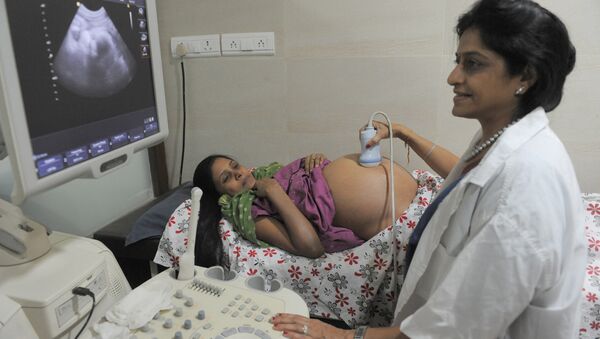New Delhi (Sputnik): The Mangalam, a newspaper from India’s most literate state of Kerala, has published an elaborate article describing techniques and habits that would enable a woman to conceive a boy.
India newspaper offers 'tips' for conceiving a baby boy — https://t.co/DtAMJbooL4
— Ajay Jolly (@ajayjolly) December 14, 2016
Shame on you Mangalam Editorial board
The bizarre set of tips given in all seriousness includes eating plenty of mutton, dried grapes, never skipping breakfast and always sleeping with the face turned leftwards. It also advised couples to attempt procreation on the first, third, fifth or seventh days of the week, when sperms were “scientifically” shown to be stronger.
Indian newspaper Mangalam has released an article with 'tips' for conceiving a baby boy… Here's a tip, stop buying the Mangalam.
— Swami Baracus (@SwamiBaracus) December 14, 2016
The first protest was registered bytheladiesfinger.comwith a sarcastic take on the article after translating it from the local Malayalam language to English. “With all these inconvenient laws regarding sex determination, it is a relief that there is finally a fool-proof checklist to follow for boy-bearing (not to be confused with ball-bearing), especially if God forbid, the blood moon sacrifices conducted by your extended family for a male heir hasn’t worked out yet,” read the feminist website.
Want to Conceive a Baby Boy? This Malayalam Daily has tips! https://t.co/t0yFpqDcYq via @theladiesfinger
— Sanjoy Narayan (@sanjoynarayan) December 14, 2016
In most of India, the preference for a male child is due to traditional gender bias and discrimination. Girls are seen as an economic liability and burden, partly because of the very expensive dowry that must accompany her marriage. However, dowry is not the only cause for the selective abortion of girls; sons carry on the family name and often inherit property and perform the last rites of their parents. The poor eliminate their girls in fetus because of poverty and for the rich, daughters are seen as less desirable.
What’s perturbing from an Indian point of view is that the article was published from Kerala, a state which either tops or ranks high in most socio-economic indicators.
“It is very shocking that a publication from a state with the highest number of literate people did that. It shows the gender bias that has become intrinsic to our society,” Dr Ranjana Kumari, a noted activist working in the areas of female rights and girl child, told Sputnik.
“This article is even more ridiculous than usual, but such ideas are common. It shows that attitudes like this still flourish despite initiatives taken by the Indian government, NGOs and health workers. The message isn't going through: people still value boys more than girls,” Gita Aravamudan, Indian author of “Disappearing Daughters: The Tragedy of Female Foeticide,” was quoted in the media.



